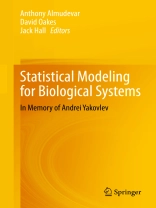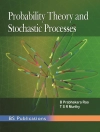This book commemorates the scientific contributions of distinguished statistician, Andrei Yakovlev. It reflects upon Dr. Yakovlev’s many research interests including stochastic modeling and the analysis of micro-array data, and throughout the book it emphasizes applications of the theory in biology, medicine and public health. The contributions to this volume are divided into two parts.
Part A consists of original research articles, which can be roughly grouped into four thematic areas: (i) branching processes, especially as models for cell kinetics, (ii) multiple testing issues as they arise in the analysis of biologic data, (iii) applications of mathematical models and of new inferential techniques in epidemiology, and (iv) contributions to statistical methodology, with an emphasis on the modeling and analysis of survival time data.
Part B consists of methodological research reported as a short communication, ending with some personal reflections on researchfields associated with Andrei and on his approach to science. The Appendix contains an abbreviated vitae and a list of Andrei’s publications, complete as far as we know.
The contributions in this book are written by Dr. Yakovlev’s collaborators and notable statisticians including former presidents of the Institute of Mathematical Statistics and of the Statistics Section of the AAAS. Dr. Yakovlev’s research appeared in four books and almost 200 scientific papers, in mathematics, statistics, biomathematics and biology journals. Ultimately this book offers a tribute to Dr. Yakovlev’s work and recognizes the legacy of his contributions in the biostatistics community.
Содержание
Chapter 1. Stochastic Models of Cell Proliferation Kinetics based on Branching Processes.- Chapter 2. Age-Dependent Branching Processes with Non-Homogeneous Poisson Immigration as Models of Cell Kinetics.- Chapter 3. A Study of the Correlation Structure of Microarray Gene Expression Data Based on Mechanistic Modeling of Cell Population Kinetics.- Chapter 4. Correlation Between the True and False Discoveries in a Positively Dependent Multiple Comparison Problem.- Chapter 5. Multiple Testing Procedures: Monotonicity and Some of Its Implications.- Chapter 6. Applications of Sequential Methods in Multiple Hypothesis Testing.- Chapter 7. Multistage Carcinogenesis: A Unified Framework for Cancer Data Analysis.- Chapter 8. A Machine-Learning Algorithm for Estimating and Ranking the Impact of Environmental Risk Factors in Exploratory Epidemiological Studies.- Chapter 9. A Latent Time Distribution Model for the Analysis of Tumor Recurrence Data: Application to the Role of Age in Breast Cancer.- Chapter 10. Estimation of Mean Residual Life.- Chapter 11. Likelihood Transformations and Artificial Mixtures.- Chapter 12. On the Application of Flexible Designs when Searching for the Better of Two Anticancer Treatments.- Chapter 13. Parameter Estimation for Multivariate Nonlinear Stochastic Differential Equation Models: A Comparison Study.- Chapter 14. On Frailties, Archimedean Copulas and Semi-Invariance Under Truncation.- Chapter 15. The Generalized ANOVA – A Classic Song Sung with Modern Lyrics.- Chapter 16. Analyzing Gene Pathways from Microarrays to Sequencing Platforms.- Chapter 17. A New Approach for Quantifying Uncertainty in Epidemiology.- Chapter 18. Branching Processes: A Personal Historical Perspective.- Chapter 19. Principles of Mathematical Modeling in Biomedical Sciences: An Unwritten Gospel of Andrei Yakovlev.
Об авторе
Anthony Almudevar is an Associate Professor of Biostatistics and Computational Biology at the University of Rochester. He received his Ph.D from the Department of Statistics at the University of Toronto. His research interests include genetics, bioinformatics, optimization and control theory, particularly in the area of Markov Decision Processes.
David Oakes is a Professor of Biostatistics and Statistics at the University of Rochester. He received his Ph.D from London University. His major research interests are in the area of survival analysis, especially models for the effect of explanatory variables on survival and for multivariate survival data. More recent work has largely focused on the models for bivariate survival models generated by unobserved random effects, often called frailties.
W. Jackson “Jack” Hall, Ph.D., was Emeritus Professor of Statistics and Professor in the Department of Biostatistics and Computational Biology at the University of Rochester. He was an international authority on statistical designs for modern clinical trials. Throughout a distinguished career that spanned more than 40 years in Rochester, Dr. Hall made numerous contributions to the field of mathematical statistics.












